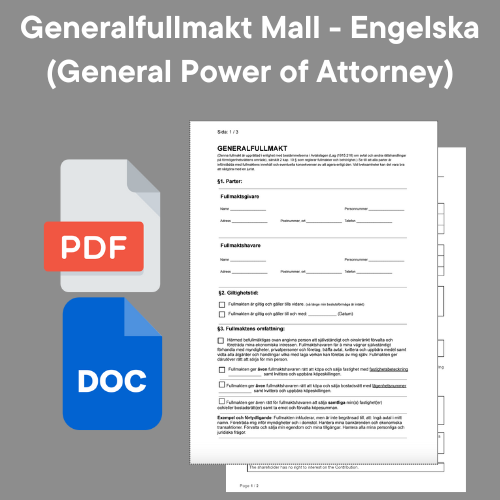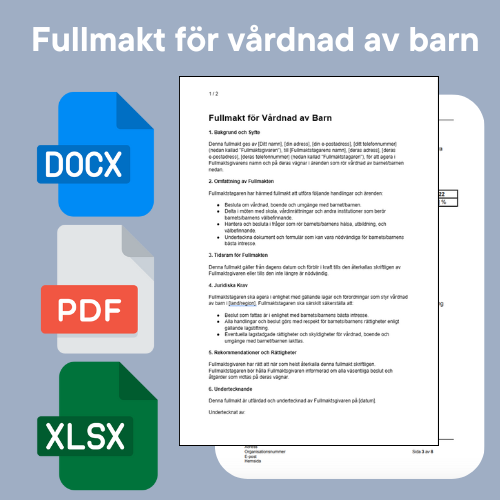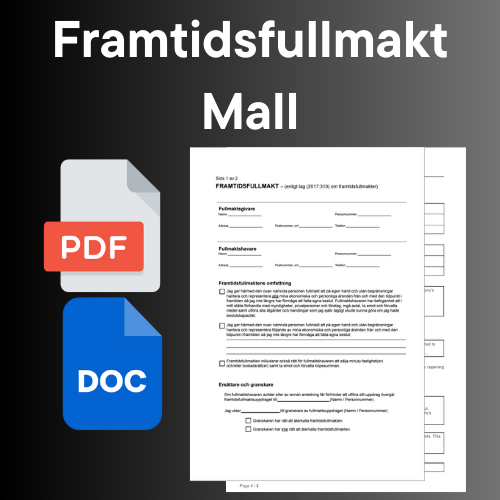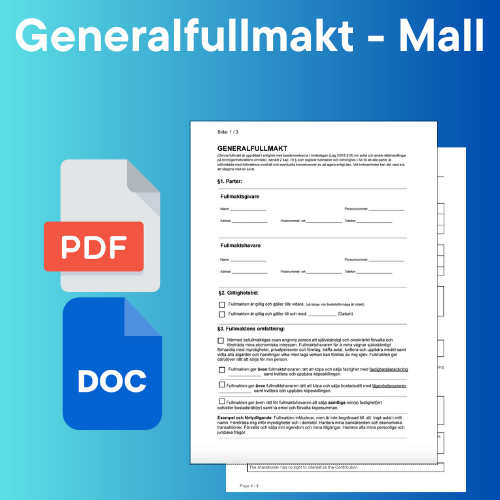Power of Attorney: A Comprehensive Guide
Share
Power of Attorney: A Comprehensive Guide
A power of attorney is a legal document that allows you to appoint someone to manage your financial and personal affairs if you become incapacitated. Learn how to establish a future power of attorney and why it is important for your security and future.
Table of Contents
- What is a Power of Attorney?
- Why is a Power of Attorney Important?
- How do you establish a Future Power of Attorney?
- Select Power of Attorney
- Specify the Scope of the Power of Attorney
- Written Form and Witnesses
- Keep the Power of Attorney Safe
- When does a Future Power of Attorney take effect?
- What Powers Can Be Included in a Future Power of Attorney?
- Restrictions and Protection Mechanisms
- Power of Attorney and Other Legal Instruments
- Termination of Power of Attorney
- Summary
What is a Power of Attorney?
A power of attorney is a legal document that allows one person (the power of attorney) to appoint another person (the power of attorney) to manage their financial and personal affairs in the event that they are no longer able to do so themselves. This may be due to age, illness or other incapacity. Powers of attorney are an important tool to ensure that one's wishes are respected and that one's affairs are managed properly when one is no longer able to do so for oneself.
Why is a Power of Attorney Important?
Future powers of attorney give the grantor security in the knowledge that their affairs will be handled by a trusted person should they lose the ability to do so themselves. It also reduces the risk of conflict within the family and can prevent the appointment of a good man or guardian by the court, which is often more costly and less flexible.
How do you establish a Future Power of Attorney?
Drawing up a future power of attorney requires accuracy and follows certain formal requirements to be legally valid. Here are the steps to create a future power of attorney:
1. Select Power of Attorney
The first and perhaps most important task is to choose a suitable person to act as a proxy holder. This should be a person in whom the authorizer has full confidence and who is willing to take on the responsibility. It is also possible to appoint several authorized representatives who can act jointly or individually.
2. Specify the Scope of the Power of Attorney
The power of attorney must clearly specify what powers the power of attorney holder must have. This may include managing bank accounts, paying bills, managing real estate, making health care decisions, and other personal matters.
3. Written Form and Witnesses
A power of attorney for the future must be drawn up in writing and signed by the person giving the power of attorney. In addition, two witnesses must be present at the signing. The witnesses must be over 15 years of age, must not be close to the giver of the power of attorney or the holder of the power of attorney, and must not themselves be beneficiaries according to the power of attorney.
4. Keep the Power of Attorney Safe
Once the future power of attorney is drawn up, it should be kept in a safe place. It is important that both the authorizer and the authorized holder know where the document is. The power of attorney can also inform related and relevant institutions about the existence of the power of attorney and where it is kept.
When Does a Future Power of Attorney Take Effect?
A power of attorney for the future comes into effect when the person giving the power of attorney no longer has the ability to make their own decisions. It is up to the power of attorney to judge when this occurs, but it may be wise to include in the power of attorney a provision that a medical certificate is required confirming the power of attorney's condition. This can prevent abuse and ensure that the power of attorney is only used when really needed.
What Powers Can Be Included in a Future Power of Attorney?
A power of attorney for the future can cover a wide range of powers, depending on the wishes of the person giving the power of attorney. Some examples of common powers are:
- Financial matters : Managing bank accounts, paying bills, managing investments, selling real estate, and tax matters.
- Personal affairs : Decisions about housing, choice of care and social care, applications for social benefits and contacts with authorities.
- Legal matters : Representation in legal disputes, signing of legal documents and agreements.
Restrictions and Protection Mechanisms
A future power of attorney can contain various types of restrictions and protection mechanisms to prevent abuse. For example, the grantor may decide that the grantee must consult with a third party before certain important decisions are made, or that certain decisions require the approval of another person. It is also possible to appoint a special auditor who regularly checks the actions of the power of attorney.
Power of Attorney and Other Legal Instruments
A power of attorney is different from other legal instruments such as wills and ordinary powers of attorney. Unlike a will, which regulates how a person's assets are to be distributed after death, a power of attorney applies during the person's lifetime and comes into effect when the person can no longer make their own decisions. An ordinary power of attorney ceases to be valid when the giver of the power of attorney becomes incapacitated, while a future power of attorney is intended to be valid during this period.
Termination of Power of Attorney
A power of attorney for the future can be revoked by the person giving the power of attorney as long as he has decision-making capacity. The power of attorney may at any time decide that the future power of attorney shall no longer apply, which should be done in writing and notified to the power of attorney holder and any interested parties. If the power of attorney dies, the future power of attorney automatically ceases to apply.
Summary
A future power of attorney is a powerful and important tool to ensure that one's financial and personal affairs are handled in a safe and orderly manner if one is no longer able to do so himself. By carefully selecting a trusted proxy holder, clearly specifying powers and including the necessary safeguards, the risk of conflicts and abuse can be minimized. Establishing a power of attorney for the future is a wise and thoughtful act that gives both the power of attorney and their relatives peace of mind.
To facilitate the process, we offer on our website document templates for future powers of attorney that meet the legal requirements and can be adapted to your specific needs. Our templates are designed to be easy to use and ensure that all necessary details are included, so you can feel confident that your wishes will be respected and your affairs handled in the best possible way. Visit our website today to download a Future Power of Attorney and take control of your future.




